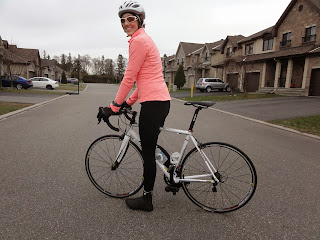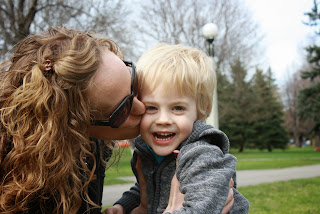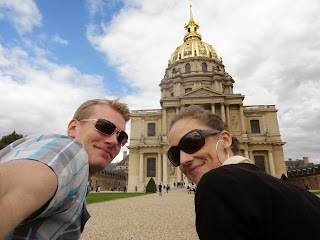It's been too long since my last post, and for that I apologize. I’ve had a rough week. Well, a rough few weeks, to be more accurate. I’ve lost my iPod, my phone, my wallet, my padlock, my planner, my gloves, my motivation, my water bottle, my hard drive, my temper, and an entire chapter of my book. I’m a little surprised that I haven’t lost my children somewhere along the way. A few of those things I’ve managed to recover, but not all of them.
I would love to chalk it up to chemo brain, but when I mentioned this to my doctor, she disagreed. “You’re just exhausted,” she said. Fingers in a few too many pies. You’d think after cancer that I’d learn, that I’d be more enlightened, more aware of my limitations and my tendencies to take on too much.
I would love to chalk it up to chemo brain, but when I mentioned this to my doctor, she disagreed. “You’re just exhausted,” she said. Fingers in a few too many pies. You’d think after cancer that I’d learn, that I’d be more enlightened, more aware of my limitations and my tendencies to take on too much.
You’d think.
 |
| The happy dance I'd like to have. |
See, I really thought that after cancer I would become a
better person. I think it is part of the mythology of survivorship. There is
this misconception that since we’ve faced death and survived, we’ll come out
the other side more patient, more joyful, more calm, less hurried – in other
words, better. There are countless books perpetuating this myth, so when
one does survive cancer and does not
come out the other side automatically enlightened, calm, and amazingly joyful,
it can feel like a bit of a failure. When I am not happy every day, I am
frustrated with myself, because I feel that I should be happy. I survived leukemia for crying out loud. Every day
should be a happy dance.
Right.
But let’s back up for a second. I need to tell you a little
story. First, I finally got my pony. Thanks to the generosity of Euro-Sports
and the creative budgeting of my husband, I was able to land a beautiful new
road bike at a fairly low cost. Even better, I managed to pick it up right
before the snow fell and ended the road riding season. I got exactly one ride
outside on my new steed, and it was glorious.
 |
| My first and only outdoor ride on my new pony. (Yes it was cold.) |
I gave myself two days to
have a pity party. I cried, I wandered the house in a daze, I stopped answering
my phone, I whined incessantly to my husband (yes, he deserves your sympathy).
I served spaghetti with sauce from a jar for dinner. Twice. Then my kids got
sick and started puking everywhere (hopefully not from the spaghetti), which
only further extended my little
But one does not survive
leukemia and a bone marrow transplant and multiple life-threatening infections
to be taken down by a running injury. At least that's the mythology. We are survivors. Nothing is as bad as cancer. We are tough as nails. (Right?)
 |
| What a "home gym" looks like around here. |
And then winter came with a vengeance. Since I cannot run
and don’t cross-country ski, all my exercise became an indoor endeavour. Full
disclosure: I am not a winterized Canadian. Even though I have lived in the
Ottawa area for eight years, I was born and raised in the Vancouver area, where
it usually only snows in the mountains (where it belongs). So inevitably, when the winter cold hits around here, with no real mountains to snowboard on, I get a
little grumpy. And then I chastise myself for being grumpy. Because at least
I’m not in the hospital, right? How could anyone who survived cancer ever be
ungrateful about anything after that?
And this is where the mythology hits again. Should
cancer survivors be grateful and joyful and embrace every delicious second of
life, every single day? (“Hooray! I’m so grateful that I had enough energy to
run hard and get injured! Three cheers for injuries!”)
Maybe we should. But even though I am a chimera and probably a mutant from all that radiation, I’m still mostly human, and I still get bummed out. So every time I am unhappy or stressed or
depressed, I feel guilty because I “should” be happier. And then I get stressed
that the stress is going to bring back the cancer, which stresses me out even
more (you follow me?). I have set myself up to be this inspirational story, but
often I do not feel very inspirational. I sometimes yell at my kids. I growl at
my husband. My floors are dirty (really dirty). I skip workouts. I hardly ever meditate. I don’t create anything worthy of
Pinterest. I drink too much coffee and wine. I lose things all the time. Often
I feel like I’m just barely getting by.
Why am I admitting this to you? Because cancer doesn’t
automatically make anyone a better person. And surviving it doesn’t
automatically give you a better life or a clearer purpose. I wish it did. But
we have to choose what to do with our scars. Sometimes we rise above them and
become the inspirational story we want to be, and sometimes they swallow us
whole. And sometimes both of those things can happen in the same week.
 It has been nearly eighteen months since my transplant, and
while most days feel pretty normal, some days I go down a black hole of anger
from which I struggle to crawl out. “Why me?” rears its very ugly head, and
then I berate myself for the indulgent whining, because I have been blessed with so
much.
It has been nearly eighteen months since my transplant, and
while most days feel pretty normal, some days I go down a black hole of anger
from which I struggle to crawl out. “Why me?” rears its very ugly head, and
then I berate myself for the indulgent whining, because I have been blessed with so
much.
I got on the bike yesterday, pedalled for twelve
minutes and then quit. If you’ve been reading my blog for a while, you’ll know
that this is very uncharacteristic of me. There are very few workouts that I
have started and not finished. I've done two hour sessions on the trainer. But I just couldn’t do it. My brain and my body
were not communicating. Nothing was firing. And I gave up.
I know. Never give up, right? But sometimes I do. There, I said it. Myth shattered.
Cancer happens to all kinds of people. Nice people, mean
people, young people, old people, rich people, poor people, healthy people, sick people. Anyone at all. And the
experience might make us better. But it might also make us angry, bitter, hurt,
and sad. I heard someone say the other day, “You know, I bet when they look
back at it, some people are glad that they got cancer, because of how it
changed things.” I nearly screamed (and then I reminded myself that a more enlightened person does not scream at others). Yes indeed, I'm so glad that I got cancer and that my life blew up, that my kids were traumatized, that my husband didn't sleep for a year, that we spent a small fortune on supplements and medication, and that my body was permanently damaged. I want to rip all that “cancer is a gift” nonsense into a million little pieces. (Clearly I have a lot of work to do in the Zen department.)
For some of us, it takes much longer to recover mentally and
spiritually than it does to recover physically. Just because we survived doesn’t
automatically make us heroes, or even good people. We are all deeply flawed, and I think most of us fall
just as often as we rise above. I am thankful every day for the forgiveness of others.
I’d like to think that surviving such an aggressive cancer
has made me tough. I’d like to think I’m pretty hardcore. Badass even. That is
the mythology, isn’t it? That I “kicked cancer’s butt” and thus am
unstoppable? But I’m exhausted. Injured. Hungry. And human (mostly).
So you see, when it all comes down to it, I'm really not a hero. I'm just a woman who needs some sleep. And maybe a sandwich.
I think it's time to show my couch some love.





















